Royal Ear Hospital
21 Capper Street, WC1E 2QG
Medical
dates:
Medical
character:
Specialist
Founded in 1816 by a Naval
surgeon, Dr. John Harrison Curtis (1778-1860), the Dispensary for
Diseases of the Ear - the first ear hospital in the UK if not in Europe
- opened at 20 Carlisle Street under the patronage of King George IV.
Shortly after this it moved to No. 10 Dean Street in Soho.
By 1845 it was known as the Royal Ear Hospital. When larger premises were needed, it moved to No. 66 Frith Street in 1876, where it had 10 beds, then in 1904 to Nos. 42-43 Dean Street in purpose-built premises.
In 1920 it became the ear, nose and throat (ENT) department of University College Hospital (UCH). A piece of land in Huntley Street was donated by the barrister and philatelist, Sir Geoffrey Duveen (1883-1975), together with £50,000 to build a hospital dedicated to the memory of his parents. Thus, the Royal Ear Hospital was erected in 1927. The balconies, essential for patients recovering from tuberculous laryngitis, faced the back of the site, away from the main street. The balconies were later enclosed to make more space for beds. By this time the Hospital had 45 beds.
The Hospital had a Silence Room for Ear Tests, which looked like a colossal safe with especially thick walls, massive doors and no windows. The floor was marked with distance points for testing a patient's hearing. It also had a Museum containing interesting specimens and models.
When the Middlesex Hospital merged with UCH in the late 1980s, its ENT department merged with the Royal Ear Hospital. A new out-patients department was built within the Middlesex Hospital Out-Patients Department in Cleveland Street to house ENT, speech therapy, audiology, the cochlear implant unit, the combined head and neck clinics, and the Medical Research Unit of the Royal National Institute of the Deaf. The Royal Ear Hospital building was requisitioned as a psychiatric unit, but then became vacant and has remained so for 20 years. It is awaiting conversion to an integrated primary care centre but Camden PCT are reputed to be willing to sell the building to UCH.
In 1997 the ENT department in Cleveland Street closed and services moved to the Royal National Throat Nose and Ear Hospital in Grays Inn Road.
By 1845 it was known as the Royal Ear Hospital. When larger premises were needed, it moved to No. 66 Frith Street in 1876, where it had 10 beds, then in 1904 to Nos. 42-43 Dean Street in purpose-built premises.
In 1920 it became the ear, nose and throat (ENT) department of University College Hospital (UCH). A piece of land in Huntley Street was donated by the barrister and philatelist, Sir Geoffrey Duveen (1883-1975), together with £50,000 to build a hospital dedicated to the memory of his parents. Thus, the Royal Ear Hospital was erected in 1927. The balconies, essential for patients recovering from tuberculous laryngitis, faced the back of the site, away from the main street. The balconies were later enclosed to make more space for beds. By this time the Hospital had 45 beds.
The Hospital had a Silence Room for Ear Tests, which looked like a colossal safe with especially thick walls, massive doors and no windows. The floor was marked with distance points for testing a patient's hearing. It also had a Museum containing interesting specimens and models.
When the Middlesex Hospital merged with UCH in the late 1980s, its ENT department merged with the Royal Ear Hospital. A new out-patients department was built within the Middlesex Hospital Out-Patients Department in Cleveland Street to house ENT, speech therapy, audiology, the cochlear implant unit, the combined head and neck clinics, and the Medical Research Unit of the Royal National Institute of the Deaf. The Royal Ear Hospital building was requisitioned as a psychiatric unit, but then became vacant and has remained so for 20 years. It is awaiting conversion to an integrated primary care centre but Camden PCT are reputed to be willing to sell the building to UCH.
In 1997 the ENT department in Cleveland Street closed and services moved to the Royal National Throat Nose and Ear Hospital in Grays Inn Road.
Present status (December 2007)
The building, belonging to Camden PCT, is vacant and awaiting either refurbishment or sale.
Update: October 2014
The building is now the Bartlett School of Architecture, which is due to move to Hampstead this year. UCLH proposes to demolished the building and build a new 6-storey centre for the treatment of patients with ear, nose, throat, head and neck disorders.
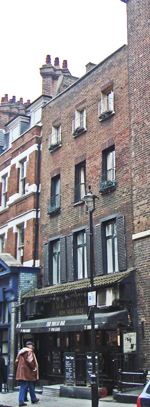
The first site of the Hospital at No. 20 Carlisle St is now the Toucan Bar.
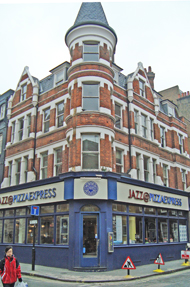
The second site at No. 10 Dean Street is just around the corner from Carlisle Street. The building is now a Pizza Express.
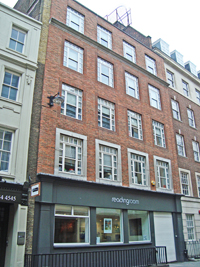
The third site, at No. 66 Frith Street, is now the Reading Room, a gallery space.
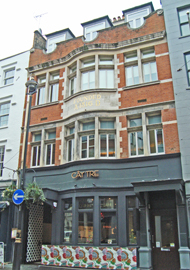
The fourth site, at Nos. 42-43 Dean Street, has become a Vietnamese restaurant - Cay Tre.
NB Photos obtained in December 2007
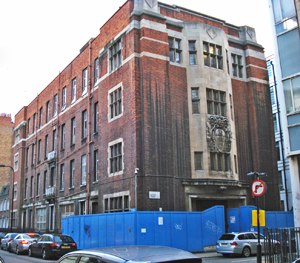
The final resting place for the Hospital at the corner of Capper and Huntley Streets.
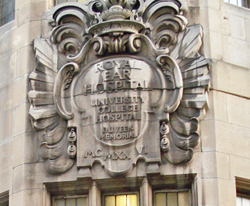
The crest above the front door in Capper Street.
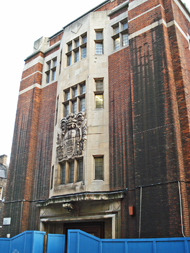
The Capper Street elevation.
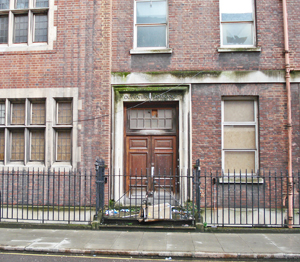
The Out-Patients entrance in Huntley Street.
NB Photos obtained in April 2014
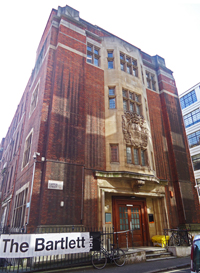
The building became the Bartlett School of Architecture in 2012.
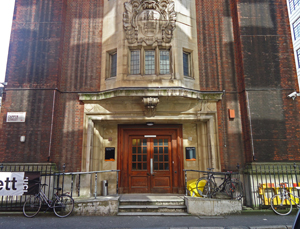
The main entrance.
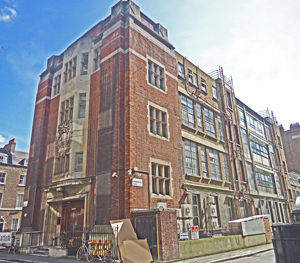
It is now proposed to demolish the building.
(Author unstated) 1892 Throat and ear practice in Great Britain. Journal of Laryngology, Rhinology and Otology 6, 447-453.
Black N 2006 Walking London's Medical History. London, Royal Society of Medicine Press
www.englishheritagearchives.org.uk (1)
www.englishheritagearchives.org.uk (2)
www.grahamfraserfoundation.org.uk
Return to home page